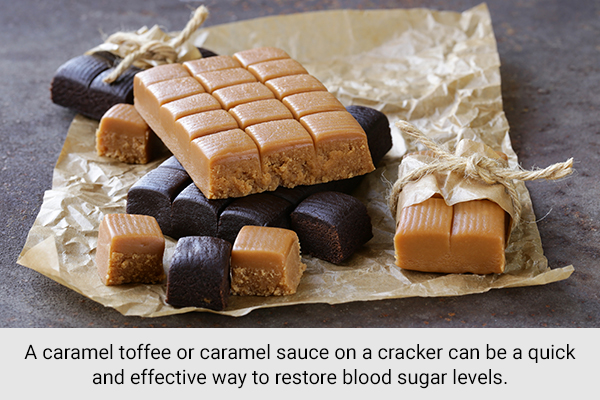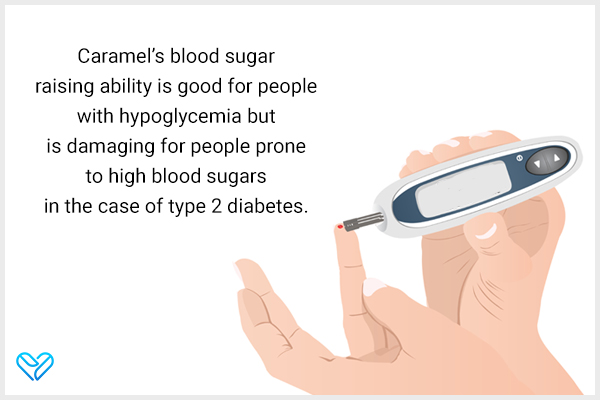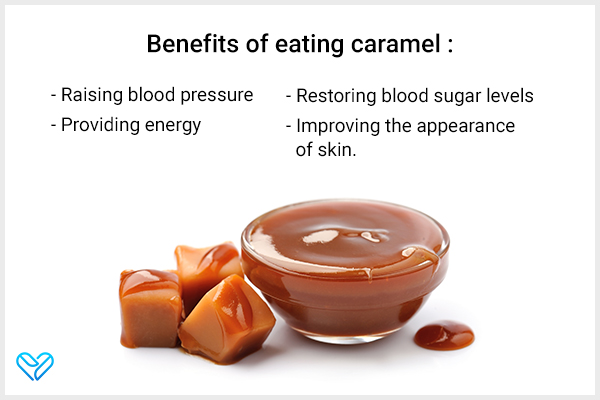In this article:
You might know caramel to be the golden-colored syrup drizzled over ice creams and coffee or made into toffees. But caramel is also used commercially to give color and flavor to some foods and drinks. (1)

Caramel is made by heating sugar until it turns golden by a process known as the Maillard reaction. Some butter, cream or milk, water, and salt may be added to make it into a sauce or syrup. (1)(2)
Because it is made purely from sugar, caramel is extremely high in calories and does not have any notable health benefits.
While some studies suggest that caramel does seem to offer some health benefits, there is a flipside to consuming excessive amounts of caramel.
Caramel as Part of a Healthy Diet
The good news is consuming caramel as part of a healthy diet may contribute to health in the following ways.
1. Provides antioxidants
Caramel is considered an antioxidant. Because of this, it is also used in commercial foods to prevent spoilage.
This antioxidant benefit also extends to the human body, and studies have found caramel to protect human cells from damage by free radicals. (3)
2. Provides energy when you feel fatigued or low
Caramel is made from sugar, which is one of the easiest and most readily digestible sources of glucose. The body is designed to use glucose for quick energy, and it is one of the only molecules that cross the blood-brain barrier and reach the brain. (4)
So, popping in a bite of caramel when you are feeling fatigued or low is a quick way to restore your energy level.
3. Restores blood sugar levels when there is a drop

Consuming glucose is also a way to restore blood sugar levels in the event of hypoglycemia. People with type 1 diabetes who rely on external sources of insulin are often prone to drops in blood sugar levels when there is more circulating insulin in the blood. (5)
A caramel toffee or caramel sauce on a cracker can be a quick and effective way to restore blood sugar levels.
4. Can help raise blood pressure if it has dropped below the normal range
Caramel contains sodium from sodium bicarbonate, which helps in the browning reaction of the sugar. (6) This sodium can be useful in raising blood pressure when your blood pressure has dropped below the accepted values (90/60 mmHg). (7)
5. May improve the appearance of the skin
The Maillard reaction involved in turning sugar into caramel produces a compound called melanoidin, which is higher if ammonia is added to the caramel. (6)
This melanoidin is beneficial for the skin as it protects the skin from aging and damage due to free radicals. (8)
For this reason, topical application of caramel in face masks or scrubs is beneficial for the skin.
Reasons You May Want to Avoid Caramel
Caramel consumption has drawbacks that you may need to consider.
1. Can increase weight
Caramel is a calorie-dense snack, with 1 tablespoon containing 58 calories. (9) Regular or daily consumption can lead to weight gain, especially in young children and students prone to eating candies as snacks. (10)
2. Causes spikes in blood sugar

Caramel’s blood sugar-raising ability is good for people with hypoglycemia but is damaging for people prone to high blood sugar levels, such as those with type 2 diabetes. (11)
3. May cause tooth decay
Excessive sugar consumption from candies, colas, and sweets is a major risk factor for the development of dental caries. (12)
Regular or excessive caramel consumption can lead to the formation of a bacterial film on teeth and ultimately tooth decay.
Recommendations to Consider
While it is not wise to rely on caramel for health benefits, as other alternatives such as fruits and vegetables can offer the same benefits, if not more, eating caramel as part of a healthy diet is not harmful.
In addition, using caramel as a sauce may encourage children to eat fruits or nuts, making it an effective strategy for picky eaters.
Is Caramel Gluten-Free or Vegan?
Caramel is gluten-free but not vegan unless it is made from plant milk. Check the package label for the ingredients.
Practical Takeaways

- Caramel is made from sugar by heating it until it turns into a golden-brown liquid. Water, milk, butter, salt, or sodium bicarbonate may also be added to make it into a shelf-stable syrup with a dark color.
- The browning process makes caramel a source of antioxidants that can offer some protection to the human body.
- Some other benefits of consuming caramel include raising blood pressure, providing energy, restoring blood sugar levels, and improving the appearance of the skin.
- Consuming excessive amounts of caramel can also lead to weight gain, spike blood sugar levels, and damage teeth.
- Caramel can be consumed in limited amounts as part of a healthy diet.
- Was this article helpful?
- YES, THANKS!NOT REALLY


